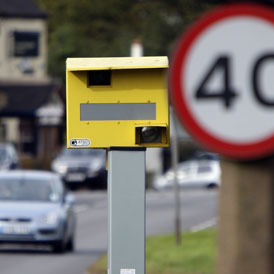Councils told to come clean on speed camera stats
Ministers and pressure groups have called for local authorities to publish better statistics on the effectiveness of speed cameras.

Ministers are calling for more local authorities to come clean on the effectiveness of speed cameras in their areas.
Links to local authority information on the controversial cameras are being published on the Department for Transport (DfT) website for the first time.
But so far, only 46 councils have published full data showing accident and casualty rates, as well as speeds at camera sites before and after the introduction of the devices.
Another 29 local authorities have published partial data, and 72 have either published no data, or not enough for the effectiveness of the camera sites to be judged.
Activists cautioned against using the figures that have been published so far to draw firm conclusions about how well speed cameras work.
The numbers show that casualty rates at some accident black spots have got worse since speed cameras were installed there, although the low numbers of incidents and short time scales involved may make it difficult to draw robust statistical conclusions.
Some camera partnerships have reported overall reductions in accidents and injuries after cameras were installed.
The DfT said police forces will be publishing the number of prosecutions arising from each permanent or long-term temporary fixed camera site in their area each year.
They will also list the total number of offences recorded by all cameras and the total number of offenders given fines or taken to court, as well as the number of people opting to complete speed awareness courses.
The information released today is incomplete and has not been academically analysed to produce an overall picture. Julie Townsend
Road Safety Minister Mike Penning said: “Local residents have a right to expect that when their council spends money on speed cameras, they publish information to show whether those cameras are helping to reduce accidents or not.
“I hope that this information will help local people to make informed judgments about the impact cameras are having on their local roads.
“However, residents can only hold their council to account if it has made information available so I would urge those councils which have not yet published their data to do so as soon as possible.”
Julie Townsend, campaigns director for road safety charity Brake, said: “The information released today is incomplete and has not been academically analysed to produce an overall picture. Without this work, it’s impossible to make general statements on speed camera effectiveness using this data.”
RAC motoring strategist Adrian Tink said: “We’re pleased to start seeing this type of information being issued – it’s long overdue.
“But unless this information is acted upon by local authorities then it becomes a pointless exercise. We’ve long called for a full audit of individual speed cameras, ensuring we keep the cameras that make a difference and replace those that don’t with other safety measures if needs be.”
AA president Edmund King said: “The effectiveness of cameras can’t just be judged on site-specific casualty rates as there are wider benefits in changing attitudes to speeding.”
Statistical battleground
Arguments about how the statistics on speed cameras should be interpreted have dogged the debate about the effectiveness of the devices.
One of the most frequently-cited studies quoted by supporters of cameras - the National Safety Camera Programme four-year evaluation report, carried out by academics from University College London and published in 2005 - was criticised for failing to allow for trend effects like regression-to-mean.
This phenomenon means that in places where there has been a randomly high number of accidents in a particular year, that number will tend to fall naturally in subsequent years even if no safety measures are introduced.
The authors of the report analysed 216 sites to see if the effect was skewing the statistics, and they concluded that "the reductions attributable to safety cameras would remain substantial after allowing for this".
Since then, other statisticians have suggested that about half the decline in accidents attributed to speed cameras can be explained by regression-to-mean.
Opponents of speed cameras like the group Safe Speed say road safety statistics were steadily improving anyway before the widespread introduction of speed cameras.